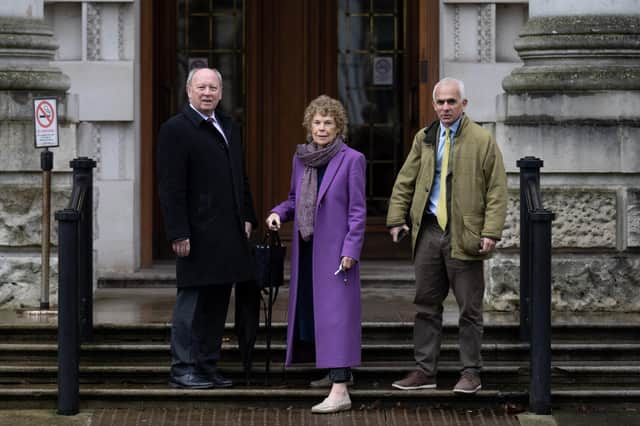Owen Polley: The challengers of the Northern Ireland Protocol are heroes of the Union


The appellants argued that the Brexit deal altered the Acts of Union, without making that constitutional change explicit, and claimed that it breached the ‘principle of consent’ which underpins the Belfast Agreement.
The case was taken by Jim Allister, Ben Habib, Baroness Hoey and other unionists, including Arlene Foster, Steve Aiken and the late Lord Trimble.
Advertisement
Hide AdAdvertisement
Hide AdWhile the legal teams made their arguments on Wednesday and Thursday, they will have to wait until the new year for the Supreme Court’s judgment.
They are appealing because the High Court in Belfast previously rejected their contention that parliament did not have the right to repeal the Act of Union ‘impliedly’ and the claim that the principle of consent was trashed by changes imposed by the protocol.
The court in London may confirm this finding eventually.
The judiciary can be endlessly inventive when it comes to dismissing cases that they feel generate uncertainty and controversy.
That certainly doesn’t mean that this legal challenge was a futile exercise. In fact, it’s been invaluable in terms of teasing out the real constitutional repercussions of the protocol, against a backdrop of misdirection and propaganda.
Advertisement
Hide AdAdvertisement
Hide AdThe case forced the government to admit, for example, that it had ‘disapplied’ important parts of the Act of Union, which is the foundation stone of the UK.
Article 6 of that statute determined that, “The subjects of Great Britain and Ireland shall be on the same footing in respect of trade and navigation, and in all treaties with foreign powers the subjects of Ireland shall have the same privileges as British subjects.”
Boris Johnson, the prime minister who agreed the protocol, initially insisted that this clause had not been changed by the legislation that implemented his Brexit deal.
The unionist legal case, though, forced the government’s lawyers to argue that parliament had a right to repeal Article 6 of the act, without spelling this intention out explicitly in the new legislation.
Advertisement
Hide AdAdvertisement
Hide AdIn other words, for the first time the litigants forced ministers to acknowledge that the protocol, and the laws that enacted it, dismantled a key part of the UK’s constitution.
The government’s legal arguments showed that it knew very well that it was changing Northern Ireland’s relationship with Great Britain.
Indeed, the case raised issues that may have a profound effect on the way our nation state is governed in the future. Previously, the courts ruled that ‘constitutional statutes’, like the Act of Union, that lay out the legal and political framework of the UK, were so important that they must be repealed ‘expressly’ with ‘unambiguous words’ that made parliament’s intentions clear.
At the High Court in Belfast, Justice Colton reasoned that the Withdrawal Agreement, which enacted the protocol, was itself a constitutional statute, so, if their provisions clashed, it took priority over the much earlier Act of Union, whether or not it used ‘unambiguous words’.
Advertisement
Hide AdAdvertisement
Hide AdThis seemed to be a new doctrine, governing a situation that judges hadn’t examined before, so its implications will be considered carefully by the Supreme Court.
In addition, the case forced the judge to put on record that, thanks to the protocol, “it cannot be said” that Great Britain and Northern Ireland “are on an equal footing with regard to trade”.
It showed explicitly that our constitutional relationship with the rest of the country had been changed.
Finally, the case highlighted enormous problems with the way that the ‘principle of consent’ has been degraded since the Belfast Agreement was signed. Many unionists accepted the unpalatable aspects of that deal only because it seemed to guarantee that Northern Ireland would remain a full part of the UK, with all the symbolism and consequences that involved, until a majority of voters here decided otherwise through a referendum.
Advertisement
Hide AdAdvertisement
Hide AdThis case has, at best, put that assumption in doubt. The litigants are appealing against the High Court’s verdict that the principle of consent did not prevent this province from being removed from the British internal market and subjected to EU jurisdiction over swathes of its economic and political life.
In his arguments in Belfast, the former Attorney General for Northern Ireland, John Larkin KC, explored how this logic affected the province’s constitutional position. “If the power to make law for NI can be handed to Brussels it can just as easily be handed to the Irish parliament,” he said.
If this was the case, then the principle of consent only protected against the “final vestige of the last removal of (British) sovereignty” here.
In last week’s column, I noted how the argument is often made that the protocol didn’t change our constitutional position. The judicial review has already shown that this claim is absolutely threadbare. It proved beyond doubt how seriously the protocol has damaged the Union.
Advertisement
Hide AdAdvertisement
Hide AdAnd it showed how the most fundamental understandings that underpinned the Belfast Agreement have been eroded to the point that they may be effectively meaningless.
The men and women who took this case, as well as the people who donated money to crowdfund it, are heroes of the Union. Whether or not they win in the Supreme Court on the points of law, their legal challenge has exposed the truth about the protocol and the way it has undermined our United Kingdom.